Intel CC150: The Strange Case of the CPU With 8C/16T and no Turbo
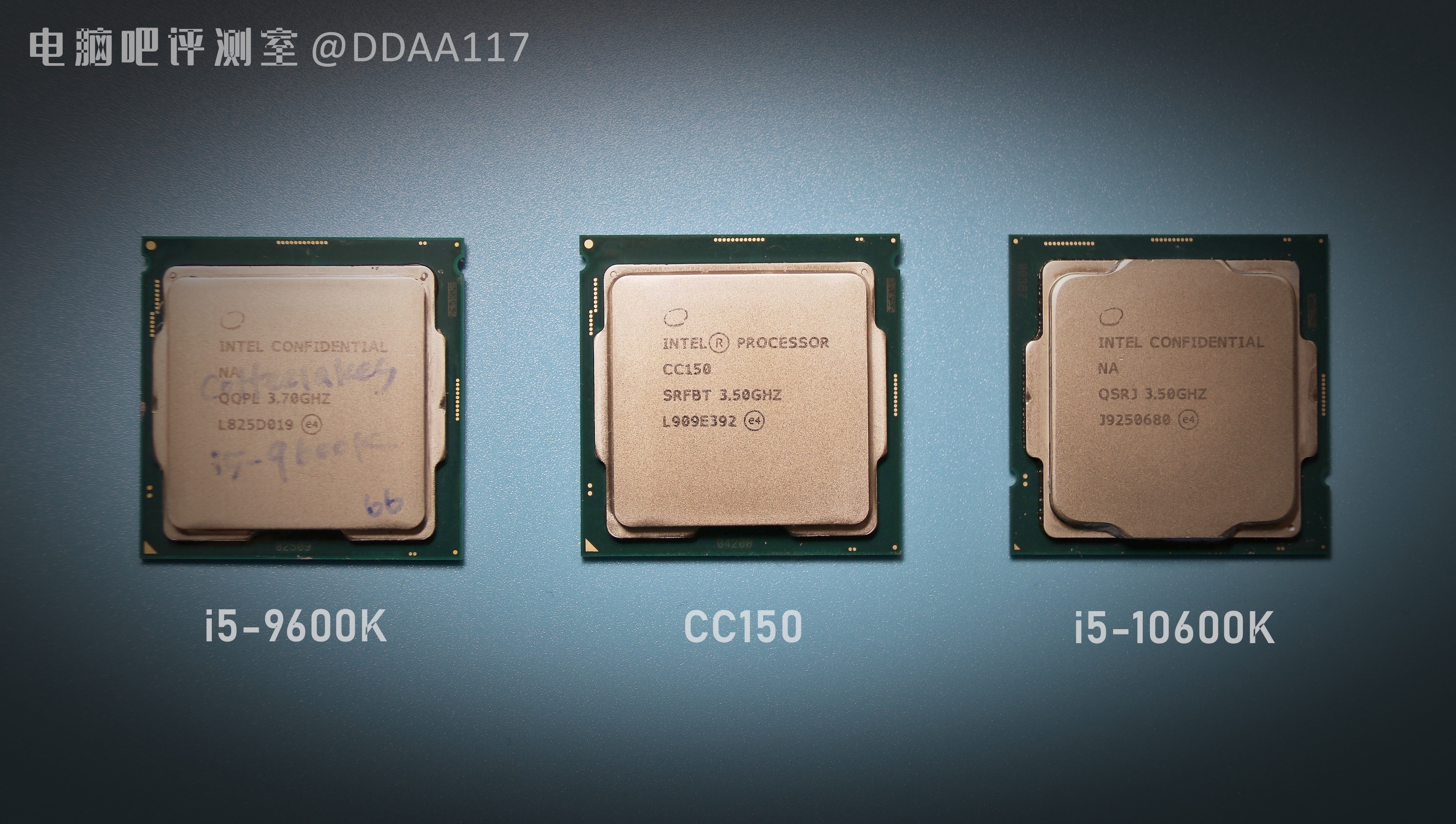
The strange and mysterious Intel CC150 processor has seemingly been benchmarked. Not only does the chip do away with traditional Intel branding, it lacks a turbo clock speed despite offering greater specs than the lower-end CPUs, like Celerons and Pentiums, that typically forgo the feature. A user of the Chinese Zhihu forums reportedly put the CC160 through its paces.
The CC150 is shrouded in mystery. One rumor suggests it powers the servers behind the Nvidia GeForce Now game streaming service. And according to the Zhihu post's images, it doesn't follow Intel's product nomenclature. There is no mention of "Core," "Celeron" or "Pentium" on its heat spreader; it only reads "Intel Processor."
According to the post's images, the CC150 is also inscribed with "SRFBT." The "S" tells us that this is a production chip and not a qualification one. The processor also sports the L909E392 batch code, meaning this particular sample originated from Intel's Malaysian factory on the 9th week of 2019.
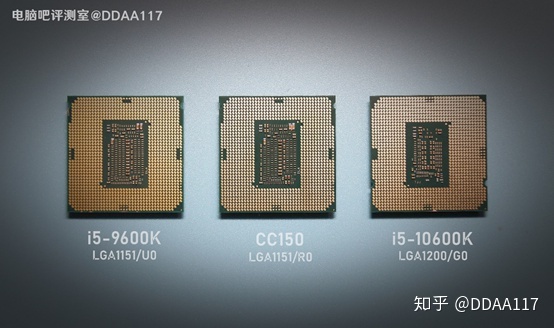
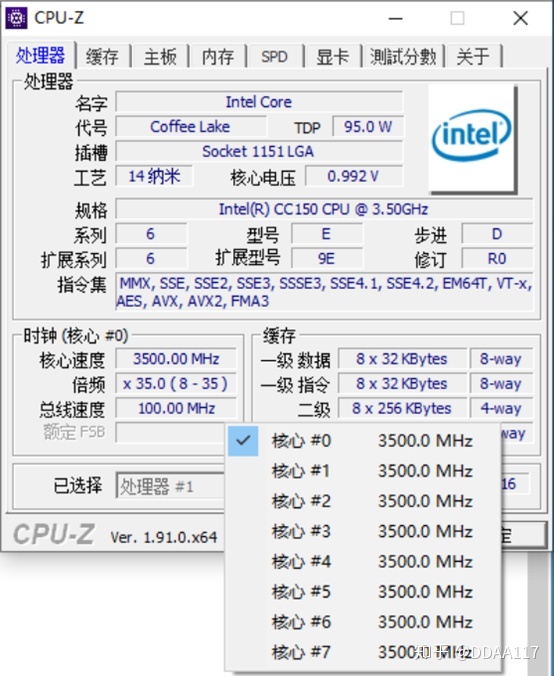
The biggest clue to the CC150's origin lies in its design. It's identical to that of Intel's current 9th-Generation Coffee Lake parts. Even the contacts and capacitors on the back of the processor are the same. We suspect the chip would slot perfectly into existing LGA1151 motherboards, as long as they've been updated to a firmware supporting the processor.
The CC150 is said to rock eight cores, 16 threads and 16MB of L3 cache, putting the CC150 in the same playing field as Intel's Core i9 chips.
The most interesting detail about the processor is that it appears to lack turbo. It's listed as running at 3.5 GHz at all times with an operating voltage that varies between 0.672V and 1.008V. According to the CPU-Z screenshot, the CC150 is rated for 95W.
Just like Intel's F-series processors, the CC150 doesn't seem to come with any integrated graphics either.
Get Tom's Hardware's best news and in-depth reviews, straight to your inbox.
Intel CC150 Benchmark Results
The Zhihu user paired the CC150 with an ASRock Z390 Extreme4 motherboard and 16GB of DDR4-2666 RAM. While far from an in-depth review, the CPU-Z benchmark and Cinebench R20 results provide an idea of how the CC150 stacks up against Intel's other processors.
| Header Cell - Column 0 | Intel Core i9-9900K | Intel Core i7-9700K | Intel CC150 | Intel Core i7-8700K | Intel Core i5-9600K | Intel Core i5-9500 | Intel Core i5-9400F | Intel Core i3-9100F |
|---|---|---|---|---|---|---|---|---|
| Cinebench R20 Single-Core | 212 | 209 | 151 | 198 | 193 | 184 | 173 | 172 |
| Cinebench R20 Multi-Core | 2042 | 1521 | 1510 | 1413 | 1030 | 986 | 945 | 642 |
It reportedly performed 15% faster than the Intel Core i7-8700K in the CPU-Z multi-thread test, thanks to having two more cores. However, the i7-8700K's single-thread performance was 4% better than that of the CC150.
The i9-9900KF delivered up to 22% and 2% higher multi-and single-thread performance, respectively, than the CC150.
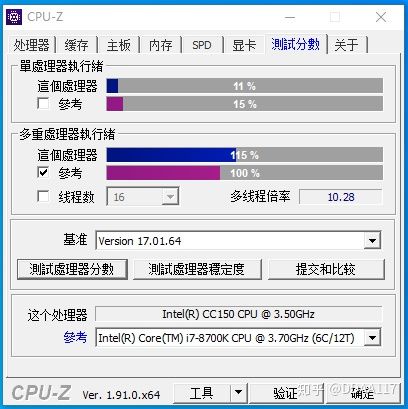
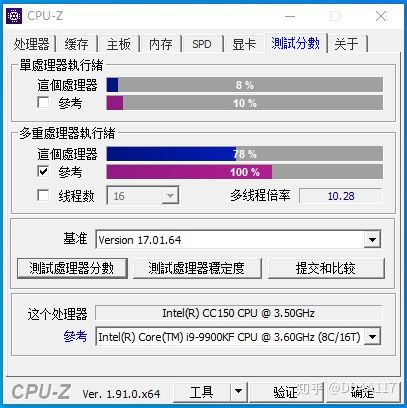
Due to the lack of turbo, the CC150 showed an underwhelming single-core Cinebench R20 score. With these numbers, the processor would fall behind the i3-9100F, which has a 4.2 GHz boost clock.
However, the CC150 held its own in the multi-core test. Although it doesn't have turbo, the eight-core chip does feature Hyper-Threading, which makes a big difference in multi-core workloads. For this same reason, the CC150 was just a hair shy of matching the i7-9700K in the Cinebench R20 multi-core test.
In terms of power consumption, the CC150 drew just about the same amount of power as a six-core i5-9500 . Although the CC150 flexes eight cores and 16 threads, its static 3.5 GHz clock speed allows it to pull less power.
| Header Cell - Column 0 | Intel Core i3-9100F | Intel Core i5-8500 | Intel Core i5-9500 | Intel CC150 | Intel Core i5-9600K | Intel Core i7-8086K | Intel Core i7-9700K | Intel Core i9-9900K |
|---|---|---|---|---|---|---|---|---|
| AIDA64 Full Load | N/A | 62W - 64W | 61W - 63W | 61W - 63W | 71W - 80W | 95W - 110W | 115W - 130W | 150W - 170W |
| AIDA64 FPU | 52W - 54W | 73W - 75W | 75W - 77W | 77W - 78W | 80W - 110W | 122W - 160W | 190W - 220W | 220W - 295W |
It's impossible to draw true conclusions based on these few test results, plus we're uncertain if the testing environment was the same for all the processors involved. But based on what we have seen, the CC150 seems like it performs similarly to an i7-9700K in multi-core workloads with a rather modest power consumption that's equivalent to an i5-9500.
Taobao sellers are currently listing the Intel CC150 for 2,160 yuan, which is roughly $310. Single-core performance may be subpar, but based on these results, the CC150 offers the same multi-core performance as the i7-9700K for $85 less.

Zhiye Liu is a news editor, memory reviewer, and SSD tester at Tom’s Hardware. Although he loves everything that’s hardware, he has a soft spot for CPUs, GPUs, and RAM.
-
jimmysmitty The sSpec is odd. When searching for it it comes up as the Intel Xeon Scalable Gold 5128:Reply
http://www.cpu-world.com/sspec/SR/SRF8T.html
As far as I know Intel does not reuse the same sSpec number within the same generation or couple of generations if at all. So why would a random unlisted CPU from Intel in China have the same sSpec as an official Xeon?
If you search cpu-worlds site with SRF8 it will list only Xeon CPUs from the same family (Scalable).
This CPU also was first seen in a screenshot for nVidias GeForce Now servers:
GeForceNOW/comments/ctinfxView: https://www.reddit.com/r/GeForceNOW/comments/ctinfx/new_servers_on_geforce_now/
Another weird thing found is this:
https://browser.geekbench.com/v4/cpu/14832851
Geekbench shows it as a Kaby Lake and has very old chipset information.
It is also Stepping 13 which matches the 9900Ks but not the 9700K or 9900K/KF. As well Geekbench shows the 9 series as Coffee Lake not Kaby Lake like the CC150.
So my bet is that this is either a fake, considering the sSpec number, or is a specialized CPU designed by Intel for Nvidia to be used for their GeForce now and was either eventually replaced with better CPUs and these have ended up in the hands of people wanting to sell them like ES samples tend to.
Edit
https://browser.geekbench.com/v5/cpu/258737
Found that. Refers to it as a Quanta Coffee Lake S motherboard.
Looks like Quanta is a pretty large ODM in Taiwan. I still say this is probably a chip for the Nvidia GeForce Now thats being resold. -
TCA_ChinChin Replyjimmysmitty said:The sSpec is odd. When searching for it it comes up as the Intel Xeon Scalable Gold 5128:
http://www.cpu-world.com/sspec/SR/SRF8T.html
As far as I know Intel does not reuse the same sSpec number within the same generation or couple of generations if at all. So why would a random unlisted CPU from Intel in China have the same sSpec as an official Xeon?
If you search cpu-worlds site with SRF8 it will list only Xeon CPUs from the same family (Scalable).
This CPU also was first seen in a screenshot for nVidias GeForce Now servers:
GeForceNOW/comments/ctinfxView: https://www.reddit.com/r/GeForceNOW/comments/ctinfx/new_servers_on_geforce_now/
Another weird thing found is this:
https://browser.geekbench.com/v4/cpu/14832851
Geekbench shows it as a Kaby Lake and has very old chipset information.
It is also Stepping 13 which matches the 9900Ks but not the 9700K or 9900K/KF. As well Geekbench shows the 9 series as Coffee Lake not Kaby Lake like the CC150.
So my bet is that this is either a fake, considering the sSpec number, or is a specialized CPU designed by Intel for Nvidia to be used for their GeForce now and was either eventually replaced with better CPUs and these have ended up in the hands of people wanting to sell them like ES samples tend to.
Edit
https://browser.geekbench.com/v5/cpu/258737
Found that. Refers to it as a Quanta Coffee Lake S motherboard.
Looks like Quanta is a pretty large ODM in Taiwan. I still say this is probably a chip for the Nvidia GeForce Now thats being resold.
Thats some valuable insight. Interesting to know that Geforce now uses these no turbo versions of Intel processors. I might have thought that something like Ryzen would have delivered comparable performance for cheaper and/or less power usage. -
jimmysmitty ReplyTCA_ChinChin said:Thats some valuable insight. Interesting to know that Geforce now uses these no turbo versions of Intel processors. I might have thought that something like Ryzen would have delivered comparable performance for cheaper and/or less power usage.
Whats more interesting is I also found an older one that shows a better CPU core wise:
nvidia/comments/7ztc0oView: https://www.reddit.com/r/nvidia/comments/7ztc0o/i_was_able_to_find_out_the_specs_being_used_in/
A Xeon E5-2697 V4 which is 18 cores and 36 threads. I would think in a situation that possibly has multiple games being tun at once to stream these would be better. However these are GTX based systems while the CC150 is RTX based.
Still its odd as every CPU Intel makes gets added to their Ark site and the CC150 is not there at all. My first guess was it was ES but having a sSpec with S, as the article states, normally means its a production CPU.
I would think someone at TH (Maybe Chris Angelini) might be able to contact Intel for more information on these CPUs. I wonder if this news gets to Intel that these are being sold they might treat them like ES samples as they are not listed as official production CPUs. -
TCA_ChinChin Reply
The Xeon usage is interesting. Maybe they moved to a Core based CPU instead due to cost? A xeon would definitely be more expensive than an equivalent CPU that was just derived from a Core based one so perhaps Nvidia decided that for the actual launch with many more users, a slightly more cost effective processor could be sourced.jimmysmitty said:Whats more interesting is I also found an older one that shows a better CPU core wise:
nvidia/comments/7ztc0oView: https://www.reddit.com/r/nvidia/comments/7ztc0o/i_was_able_to_find_out_the_specs_being_used_in/
A Xeon E5-2697 V4 which is 18 cores and 36 threads. I would think in a situation that possibly has multiple games being tun at once to stream these would be better. However these are GTX based systems while the CC150 is RTX based.
Still its odd as every CPU Intel makes gets added to their Ark site and the CC150 is not there at all. My first guess was it was ES but having a sSpec with S, as the article states, normally means its a production CPU.
I would think someone at TH (Maybe Chris Angelini) might be able to contact Intel for more information on these CPUs. I wonder if this news gets to Intel that these are being sold they might treat them like ES samples as they are not listed as official production CPUs. -
jimmysmitty ReplyTCA_ChinChin said:The Xeon usage is interesting. Maybe they moved to a Core based CPU instead due to cost? A xeon would definitely be more expensive than an equivalent CPU that was just derived from a Core based one so perhaps Nvidia decided that for the actual launch with many more users, a slightly more cost effective processor could be sourced.
Probably. And one that also supports higher base clock speeds would probably be beneficial than one that has a much lower base and only slightly higher turbo.
Still someone is selling these chips which begs the question of where they got them from. Its possible this CPU was built for more than just GeForce Now and was to be used in similar blade server situations. -
TCA_ChinChin Reply
Perhaps. Curious to know what other customers if any Intel has for the CC150 chips or if there are similar semi-custom solutions that Intel doesn't publicly disclose.jimmysmitty said:Probably. And one that also supports higher base clock speeds would probably be beneficial than one that has a much lower base and only slightly higher turbo.
Still someone is selling these chips which begs the question of where they got them from. Its possible this CPU was built for more than just GeForce Now and was to be used in similar blade server situations. -
bit_user Reply
I wouldn't expect Nvidia to use AMD CPUs, if they could avoid it.TCA_ChinChin said:I might have thought that something like Ryzen would have delivered comparable performance for cheaper and/or less power usage.
Plus, this thing probably predates Zen2. -
DDAA117 Replyjimmysmitty said:The sSpec is odd. When searching for it it comes up as the Intel Xeon Scalable Gold 5128:
http://www.cpu-world.com/sspec/SR/SRF8T.html
As far as I know Intel does not reuse the same sSpec number within the same generation or couple of generations if at all. So why would a random unlisted CPU from Intel in China have the same sSpec as an official Xeon?
If you search cpu-worlds site with SRF8 it will list only Xeon CPUs from the same family (Scalable).
This CPU also was first seen in a screenshot for nVidias GeForce Now servers:
GeForceNOW/comments/ctinfxView: https://www.reddit.com/r/GeForceNOW/comments/ctinfx/new_servers_on_geforce_now/
Another weird thing found is this:
https://browser.geekbench.com/v4/cpu/14832851
Geekbench shows it as a Kaby Lake and has very old chipset information.
It is also Stepping 13 which matches the 9900Ks but not the 9700K or 9900K/KF. As well Geekbench shows the 9 series as Coffee Lake not Kaby Lake like the CC150.
So my bet is that this is either a fake, considering the sSpec number, or is a specialized CPU designed by Intel for Nvidia to be used for their GeForce now and was either eventually replaced with better CPUs and these have ended up in the hands of people wanting to sell them like ES samples tend to.
Edit
https://browser.geekbench.com/v5/cpu/258737
Found that. Refers to it as a Quanta Coffee Lake S motherboard.
Looks like Quanta is a pretty large ODM in Taiwan. I still say this is probably a chip for the Nvidia GeForce Now thats being resold.
The S-spec is SRFBT,not SRF8T。
In fact,most of the OEM design model can not be find on Intel ARK,such as E5-2679V4(ORACLE)、i5-7420/7420T、Pentium Dual-Core G4580、CC150(Nvidia)、Core 2 Quad Q7100/Q7300/Q7500/Q7600、Xeon W2140B/2150B/2170B/2191B(APPLE)、Core 2 E8100/E8700、Core 2 Quad Q9100/Q9200(Desktop)、Xeon X5698(4.40GHz~4.66GHz/Dual Core)(HP) and so on。
You can find most of them on
https://www.taobao.comever
Apple Xeon W2140B/2150B/2170B/2191B
https://item.taobao.com/item.htm?spm=a230r.1.14.1.2b4e59c5jQIYBc&id=607124935836&ns=1&abbucket=14#detail -
jimmysmitty Replybit_user said:I wouldn't expect Nvidia to use AMD CPUs, if they could avoid it.
Plus, this thing probably predates Zen2.
I doubt it predates Zen2 considering the specs state Stepping 13 which is the same as the 9900KS. At least thats what the GeekBench infor for every CC150 listed shows.
DDAA117 said:The S-spec is SRFBT,not SRF8T。
In fact,most of the OEM design model can not be find on Intel ARK,such as E5-2679V4(ORACLE)、i5-7420/7420T、Pentium Dual-Core G4580、CC150(Nvidia)、Core 2 Quad Q7100/Q7300/Q7500/Q7600、Xeon W2140B/2150B/2170B/2191B(APPLE)、Core 2 E8100/E8700、Core 2 Quad Q9100/Q9200(Desktop)、Xeon X5698(4.40GHz~4.66GHz/Dual Core)(HP) and so on。
You can find most of them on
https://www.taobao.comever
Apple Xeon W2140B/2150B/2170B/2191B
https://item.taobao.com/item.htm?spm=a230r.1.14.1.2b4e59c5jQIYBc&id=607124935836&ns=1&abbucket=14#detail
I see the stepping was wrong. Swear I copied it from the article. SRFB also pulls up, of officially known, only Xeons.
Still looks like it is basically a chip designed for specific use and not retail production.
I guess the one difference is all of those sans the CC150 have a normal naming scheme and we normally know about them. Hell the GTX 800M series was an OEM exclusive and desktops jumped right to 900. But we knew about them and the naming scheme was the normal naming scheme.